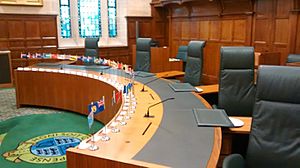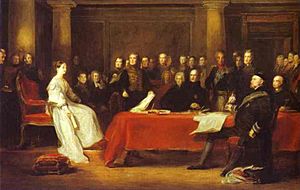Privy Council (United Kingdom) facts for kids
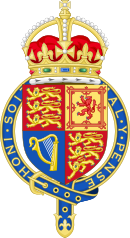
Arms used by the Privy Council Office
|
|
| Abbreviation | Privy Council, PC |
|---|---|
| Predecessor |
|
| Formation | 1 January 1801 |
| Legal status | Advisory body |
|
Membership
|
Members of the Privy Council |
| Charles III (King-in-Council) |
|
| Penny Mordaunt | |
|
Clerk
|
Richard Tilbrook |
|
Deputy Clerk
|
Ceri King |
|
Staff
|
Privy Council Office |
| Website | privycouncil.gov.uk |
The Privy Council (officially called His Majesty's Most Honourable Privy Council) is a special group of advisors to the King or Queen of the United Kingdom. Most of its members are important politicians. They are either currently in the House of Commons or the House of Lords, or they used to be.
The Privy Council gives formal advice to the King on his special powers, known as the Royal Prerogative. When the King acts with the Council's advice, it's called the King-in-Council. This body creates official documents called Orders in Council. These orders can make new laws or put existing laws into action.
The Council can also issue Orders of Council. These are used to manage certain public organizations. The Privy Council also advises the King on giving out Royal Charters. These charters give special status to groups like charities or professional bodies. They can also grant city or borough status to towns. Today, many of the Council's powers are handled by its main committee, the Cabinet of the United Kingdom.
The King-in-Council also handles some legal matters. However, the actual work of hearing cases is done by the Judicial Committee of the Privy Council. This committee is made up of senior judges. Many are from the Supreme Court of the United Kingdom or from other Commonwealth countries. The Privy Council used to be the highest court for the entire British Empire. It still hears appeals from some independent Commonwealth countries. It also hears appeals from Crown Dependencies and British Overseas Territories.
Contents
History of the Privy Council
The modern Privy Council of the United Kingdom started on 1 January 1801. Before that, there were separate Privy Councils for Scotland, England, and Great Britain.
Early Beginnings
In Anglo-Saxon England, a group called the Witenagemot was an early version of the Privy Council. After the Norman Conquest, English Kings were advised by a royal court called the curia regis. This court included important nobles, church leaders, and high officials. It helped the King with laws, managing the country, and justice.
Over time, different parts of this court became separate bodies. Law courts started handling legal cases. Parliament became the main law-making body. But the Council still kept some power to hear legal disputes. Kings sometimes used the Council to make laws without Parliament's full approval. For example, a committee of the Council, later called the Star Chamber, could punish people without following normal court rules.
Changes Over Time
By 1540, the Council had become a key national group. It mostly focused on managing the country. Kings often relied on a smaller group of advisors from the Council. This smaller group eventually became the modern Cabinet.
During the English Civil War, the monarchy and the Privy Council were removed. The House of Commons created a Council of State to run the country. Later, Oliver Cromwell became Lord Protector, and the Council's size was reduced.
In 1659, the Protector's Council was ended. When Charles II became King again, he brought back the Royal Privy Council. But he, like other Kings, preferred to work with a small group of trusted advisors. In 1707, England and Scotland joined to form the Kingdom of Great Britain. Their Privy Councils combined in 1708.
Under George I, even more power went to a small committee of the Council. This committee started meeting without the King. They would tell him their decisions afterwards. This is how the Privy Council as a whole became less involved in daily advice. Its role was taken over by the Cabinet.
When the United Kingdom was formed in 1801, a single Privy Council was created for Great Britain and Ireland. However, the Irish Privy Council continued until 1922.
What the Privy Council Does
The King can issue Orders in Council based on the Privy Council's advice. These orders are written by the government, not the King. They can be used to make new laws or to put existing laws into action.
There are also Orders of Council. These are issued by Privy Council members without needing the King's direct approval. They are often used to manage public organizations.
The King also grants royal charters on the Council's advice. Charters give special status to groups. For example, they can give "chartered" status to professional or educational bodies. They can also grant city or borough status to towns. The Privy Council handles many different things. This includes university rules, churchyards, coinage, and setting bank holiday dates.
Important Decisions
The Civil Service is officially run by Privy Council Orders. One such order once stopped staff at GCHQ from joining a trade union. Another order in 1997 allowed the Prime Minister to give some political advisors power over Civil Servants.
In the 1960s, the Privy Council made an order to move about 2,000 people from the Chagos Archipelago. This was to build a military base on Diego Garcia. Later, courts looked into this decision. In 2006, a court said the Council's decision was unlawful. However, the highest court at the time eventually upheld the original order.
Committees of the Privy Council
The Privy Council has several committees that handle specific tasks.
Executive Committee (The Cabinet)
The Cabinet of the United Kingdom is the most important committee of the Privy Council. It is the main decision-making body of the British Government.
Judicial Committee
The Judicial Committee acts as the highest court of appeal for several places. These include the Crown Dependencies, British Overseas Territories, and some Commonwealth countries. It also hears appeals from a few special courts in the United Kingdom. This committee is usually made up of judges from the Supreme Court of the United Kingdom. It also includes senior judges from Commonwealth countries who are Privy Counsellors.
Who Can Be a Member?
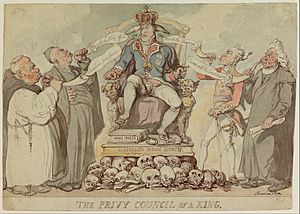
When the King acts on the Council's advice, he is called the King-in-Council. The members of the Council are known as The Lords of His Majesty's Most Honourable Privy Council. The main leader of the Council is the Lord President of the Council. This person is a high-ranking official and usually a member of the Cabinet. Another important person is the Clerk, who signs all the Council's orders.
You can call a member a Privy Counsellor or Privy Councillor. The Privy Council Office prefers "Counsellor" because it means "someone who gives advice." A new member is traditionally "sworn of" the Council after meeting the King.
The King can appoint anyone as a Privy Counsellor. But in reality, appointments are made on the advice of the government. Most members are senior politicians. This includes government ministers, the leader of the main opposition party, and leaders of devolved governments. Some senior judges, church leaders, and civil servants are also members. A few members of the Royal Family are also appointed.
There is no limit to how many people can be in the Privy Council. Not all members attend every meeting. Only a few are called to meetings regularly.
The three most senior bishops of the Church of England become Privy Counsellors when they are appointed. Senior members of the Royal Family, like the King's spouse or the heir apparent, can also be appointed. The King's private secretary, the Lord Chamberlain, and the Speaker of the House of Commons are always appointed. Judges from the Supreme Court of the United Kingdom and other high courts also join the Privy Council automatically.
Most Privy Counsellors are politicians. The Prime Minister, Cabinet ministers, and the Leader of HM Opposition usually join the Privy Council when they take office. Leaders of major political parties and some other senior politicians are also appointed.
Privy Counsellors take an oath to keep Council discussions secret. This allows the government to share secret information with opposition leaders. This is usually done in special situations, like matters of national security. For example, former Prime Minister Tony Blair shared confidential information about Iraq with opposition leaders.
Members from Other Countries
While the Privy Council is mainly British, officials from some other Commonwealth realms are also appointed. For a long time, the Prime Minister, chief justice, and senior politicians from New Zealand were Privy Counsellors. However, new appointments from New Zealand have stopped. Canada has its own Privy Council, called the King's Privy Council for Canada.
Meetings of the Council
Privy Council meetings usually happen once a month. The King attends these meetings. At least three members must be present for a meeting to happen.
The King usually stands during meetings to keep them short. The Lord President reads out a list of orders. The King simply says "Approved." Most orders are already prepared by the government and approved by the responsible minister. The King's approval is a formal step to make them official.
Full meetings of the Privy Council are rare. They happen when the King announces his engagement. They also happen when a new King or Queen takes the throne. This is called a Demise of the Crown. A full meeting, called an Accession Council, happened on 10 September 2022. This was after the death of Elizabeth II and the start of Charles III's reign. At this meeting, the Council announces the new King and receives an oath from him.
How Long Do Members Serve?
Membership in the Privy Council is usually for life. In the past, the Council would dissolve when a monarch died. But now, membership continues without a break.
The King can remove someone from the Privy Council. For example, in 2011, former MP Elliot Morley was removed after being found guilty of false accounting. Before that, Edgar Speyer was removed in 1921 for working with an enemy during World War I.
Members can also choose to resign. This sometimes happens to avoid being removed. Several members have resigned in recent years.
Special Rights and Privileges
The Privy Council as a whole is called "The Most Honourable." Its members, the Privy Counsellors, are called "The Right Honourable."
Each Privy Counsellor has the right to speak directly with the King. This right can only be used to give advice on public matters.
Privy Counsellors are also given advance notice of any Prime Minister's decision to send the armed forces into battle.
Members of the Privy Council have the right to sit on the steps of the King's Throne in the House of Lords during debates. This is a special privilege, but it is rarely used today. If a Privy Counsellor and another Member of Parliament speak at the same time in the House of Commons, the Speaker usually lets the "Right Honourable" Member speak first.
Oath and Ceremony
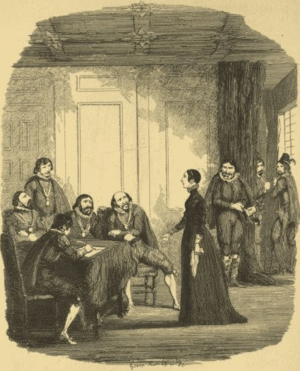
The oath that Privy Counsellors take has been used since 1571. It was once considered secret, but it was made public in 1998. In the oath, members promise to be loyal to the King. They also promise to keep all Council matters secret. They swear to protect the King's person, honour, and powers.
New Privy Counsellors have a private ceremony. They usually kneel before the King and lightly kiss his hand. Some members, like Tony Benn, have found ways to adapt this tradition. Not all members go through this ceremony; some are appointed by an Order in Council.
Other Councils
The Privy Council is one of four main councils that advise the King. The others are the law courts, Parliament (the Common Council), and the Great Council (all the nobles). The Great Council has not met since 1640.
In the past, England and Scotland had their own Privy Councils. When the two countries united in 1707, their councils combined. Ireland also had a separate Privy Council until 1922. After that, the Privy Council of Northern Ireland existed but became inactive in 1972.
Canada has its own Privy Council, called the King's Privy Council for Canada. Other Commonwealth countries, like Australia and New Zealand, have similar bodies called Executive Councils.
Images for kids
See also
 In Spanish: Consejo Privado del Reino Unido para niños
In Spanish: Consejo Privado del Reino Unido para niños


